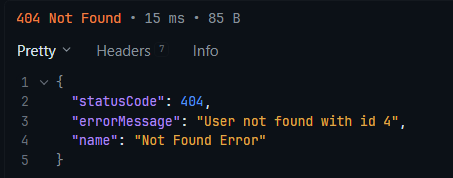express-http-error-handler is a package for handling HTTP errors in Express applications in a simple and efficient way. It provides specific error classes for the most common HTTP status codes.
To install the package, use npm:
npm install express-http-error-handlerNow we have to enable these options in our tsconfig.json para poder utilizar decoradores en typescript.
"experimentalDecorators": true,
"emitDecoratorMetadata": true, Here are the available error classes in the package:
| Error Class | HTTP Status Code | Description |
|---|---|---|
NotFoundError |
404 | Represents a 404 Not Found error |
BadRequestError |
400 | Represents a 400 Bad Request error |
InternalServerError |
500 | Represents a 500 Internal Server Error |
UnauthorizedError |
401 | Represents a 401 Unauthorized error |
ForbiddenError |
403 | Represents a 403 Forbidden error |
These are some of the decorators providing for the moment
| Decorator | Description |
|---|---|
ResMethod |
handles and validates the errors thrown and returns them to the customer |
we created our basic methods
UserService.ts
import { NotFoundError} from 'express-http-error-handler';
export class UserService{
constructor(){}
async getUserById(id : string){
const user = await this.user.findById(id);
if(!user) throw new NotFoundError(`user not found with id ${id}`);
return user;
}
}we can use the decorator provided by express-http-error-handler, which helps us to handle and validate the thrown errors
it is not necessary using a try catch block, since this decorator does the error handling and validation for you, you just return your correct operation.
UserController.ts
import { Request, Response } from 'express';
import { ResMethod } from 'express-http-error-handler';
export class UserController{
constructor(){}
@ResMethod()
async getUserById(req : Request, res : Response){
const {id} = req.params;
const user = await userService.getUserById(id);
return res.status(200).json(user);
}
}Response
In this case, we throw a NotFoundError (status code 400) from our service, using our @ResMethod decorator, we handle this error and any other error that is not thrown using this package will also be handled by returning a status code 500.
The response client receives looks like this:
As we know in pure JavaScript, decorators are not natively supported, so we can handle and trap our errors by simply validating the type of error in the try catch block of our controller.
UserController.js
import { Request, Response } from 'express';
import { HttpError } from 'express-http-error-handler';
export class UserController{
constructor(){}
async getUserById(req : Request, res : Response){
try{
const {id} = req.params;
const user = await userService.getUserById(id);
return res.status(200).json(user);
}catch(error : any){
return error instanceof HttpError
? res.status(error.statusCode).json(error)
: res.status(500).json(error);
}
}
}Response
the answer ends up being the same, the difference is that now we must validate the instance the error to know if it is of type HttpError
In this way we can use and thorw errors in express, either from services, middlewares or other validations.

